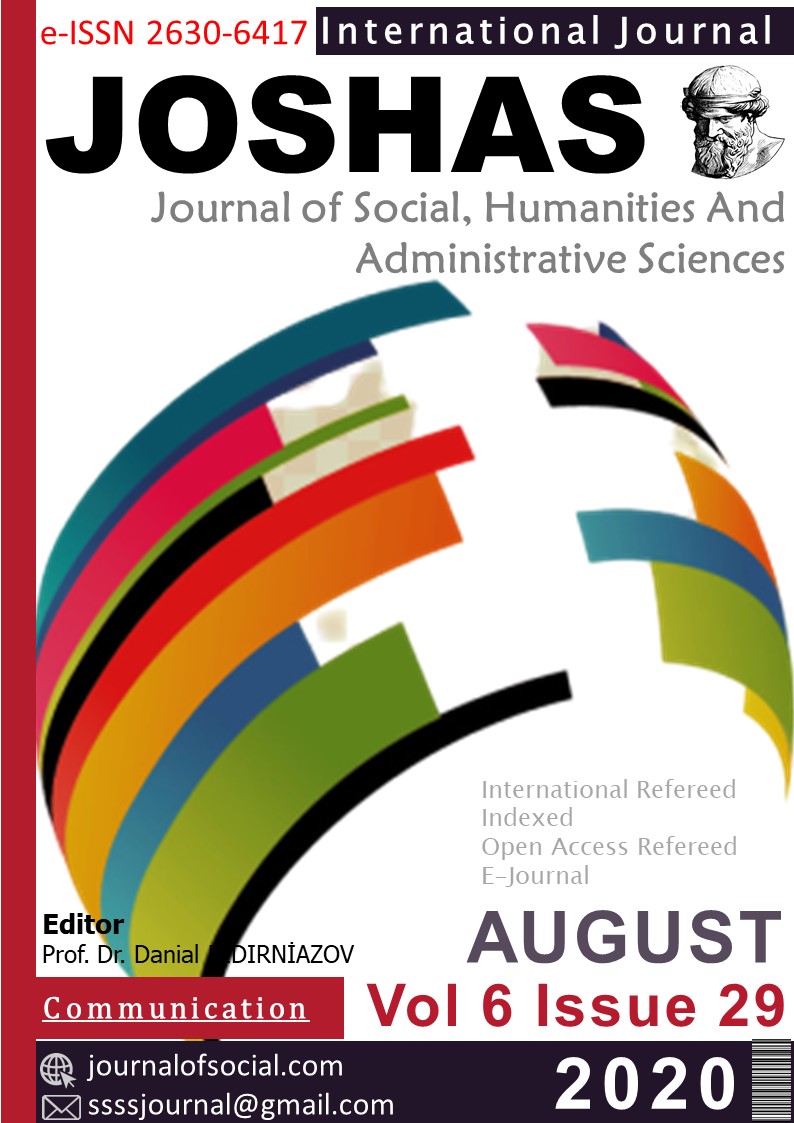VECİZ SÖZLER KAPSAMINDA EĞİTİMİN TEMEL PRENSİPLERİ VE BU BAĞLAMDA GÜNÜMÜZ EĞİTİM SORUNLARINA ÇÖZÜM ÖNERİLERİ
Author :
Abstract
Toplumların tarihin derinliklerinden getirdikleri tecrübeleri onların geleceklerine doğrudan yön vermektedir. Bu birikimlerin bir çoğu toplumların içinden çıkan entelektüel insanlar tarafından sözcüklere dökülerek zaman içerisinde nesillerden nesillere aktarılmıştır. Toplumların en temel gündemlerinden biride eğitim olduğu için bu alana yönelik söylenmiş veciz sözlerin oranı hayli yüksektir. Birçok insan eğitim hayatına bu veciz sözlerden ilham alarak yön vermiştir. Dünyaca tanınan aydınlardan Eflatun, Sokrates, Albert Einstein, Bernard Shaw, Aristo, Hz. Ali, Cervantes, Galileo Galilei, Konfüçyus, Montaigne, Atatürk, Platon, Mark Twain, Friedrich Nietzsche’ye ait onlarca eğitimle ilgili veciz söze rastlamak mümkündür. Çalışmanın amacı, geçmişten günümüze dünyadaki aydın bireylerin eğitim üzerine oluşturdukları veciz sözlerden hareketle eğitimin temel prensiplerini belirlemek ve eğitimin bugünkü sorunlarına çözümler üretmektir. Nitel araştırma kapsamında dokuman analizi yöntemiyle veciz sözleri kapsayan kaynaklar taranarak verilere ulaşılmıştır. Toplanan veriler içerik analizi ile değerlendirilmiştir. Veciz sözlerden elde edilen bulgulara göre eğitimin en temel unsurları; eğitimcinin insancıl olması, eğitimin evrensel değerleri öğretmesi, bireyde özgüvene dayalı motivasyon oluşturması, bilgiden ziyade beceri kazandırması gerektiğidir.
Keywords
Abstract
Experiences that societies brought from the depths of history provide directions to their future. Many of these accumulations have been poured into words by intellectual people that spring from societies and have been transferred from one generation to another in time. As one of the main agendas of the societies is education, the proportion of aphorisms uttered in this field is quite high. Many people have directed his education by taking inspiration from these aphorisms words. It was told by intellectuals Eflatun, Sokrates, Albert Einstein, Bernard Shaw, Aristo, Hz. Ali, Cervantes, Galileo Galilei, Konfüçyus, Montaigne, Atatürk, Platon, Mark Twain, Friedrich Nietzsche belonging to it is possible to come across dozens of aphorisms about education. The aim of the study is to determine the basic principles of education based on aphorisms articulated by intellectuals around the world from the past to the present and to produce solutions to today’s problems in education. Within the scope of qualitative research, the resources that contain aphorisms were scanned and data were obtained by document analysis method. The collected data were evaluated by content analysis. According to the findings from aphorisms, the most basic elements of education are the humaneness of educators, teaching universal values in education, creation of motivation based on self-confidence in the individual, and the need to obtain skills rather than knowledge.
Keywords
- Bayraktar, S. (2015). İnsanlığın Kanayan Yarası Çocuk İstismarı ve İhmali, İstanbul: Nobel Tıp
- Bayraktar, S. (2015). İnsanlığın Kanayan Yarası Çocuk İstismarı ve İhmali, İstanbul: Nobel Tıp Kitabevleri.
- Bıçakçı, B. (2016). Veciz Sözler, İstanbul: İletişim Yayınları
- Bryman, A. (2004). Social research methods. (8th Ed.). New York, Oxford University Press.
- Çalık, T., Sezgin, F. (2005). “Küreselleşme, Bilgi Toplumu ve Eğitim, Kastamonu Eğitim Dergisi”, 13(1): 55-66.
- Çelik, Z. (2012). “Ortaöğretime Geçiş Sınav Sistemi ve Politikaları”, 21. Yüzyılda Türkiye’nin Eğitim ve Bilim Politikaları Sempozyumu, 10-11 Aralık,
- Çengel, Y. (2007). “Özlü Sözlerle Öğretmenlik Mesleği”, Muradiye Dergisi, http://www.yunuscengel.com/ozlu-sozlerle-ogretmenlik-sanati/ (Alıntı tarihi:22.01.2020).
- Duruhan, K., İlhan, B. (2004): “Eğitim-Öğretimle İlgili Bazı Atasözü ve Deyimlerimizin Öğrenme- Öğretme Süreci Bakımından İrdelenmesi”, Milli Eğitim Dergisi, 164:119-125
- Özden, Y. (2013). Eğitimde Yeni Değerler (9. Baskı), Ankara:Pegem Akademi.
- Öztemel, E. E. (2018). “Eğitimde Yeni Yönelimlerin Değerlendirilmesi ve Eğitim 4.0”, Üniversite Araştırmaları Dergisi, 1(1): 29
- Sünbül, A. M. (1996). “Öğretmen Niteliği ve Öğretimdeki Rolleri”, Eğitim Yönetimi, 2 (1): 597-607Şentürk, C. (2009). “Eğitimde yeniden yapılanma ve yapılandırmacılık”, Eğitim-Bilim ve Sanat Dergisi, 23:1
- Yalçın, A., Aytaş, G. (2003). Çocuk Edebiyatı. Ankara: Akçağ Yayınları





